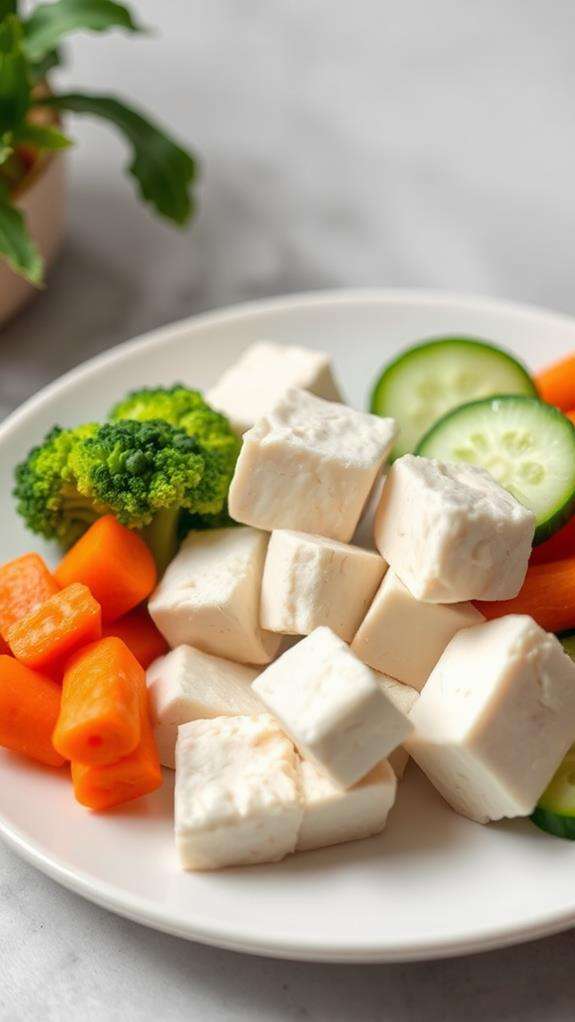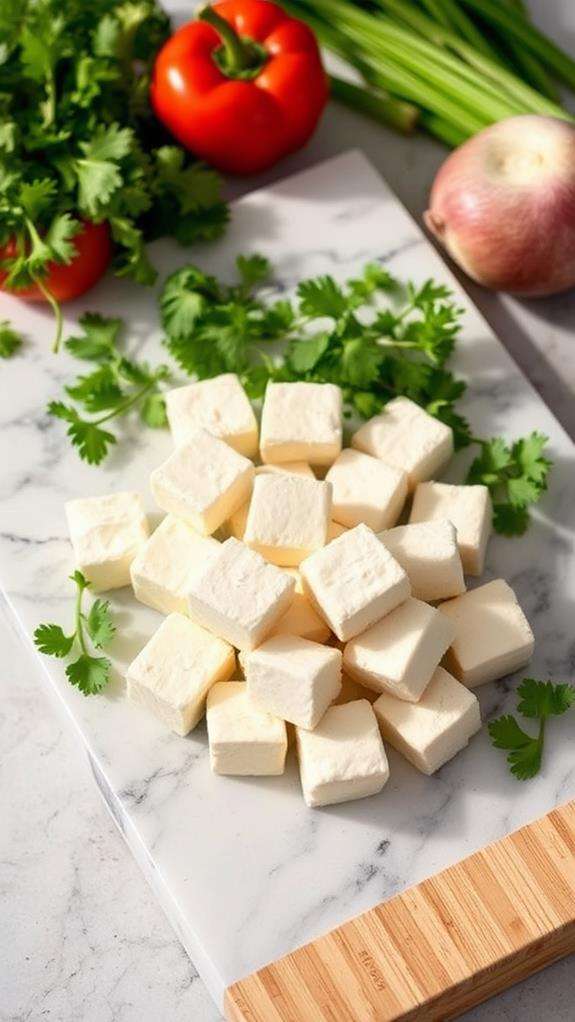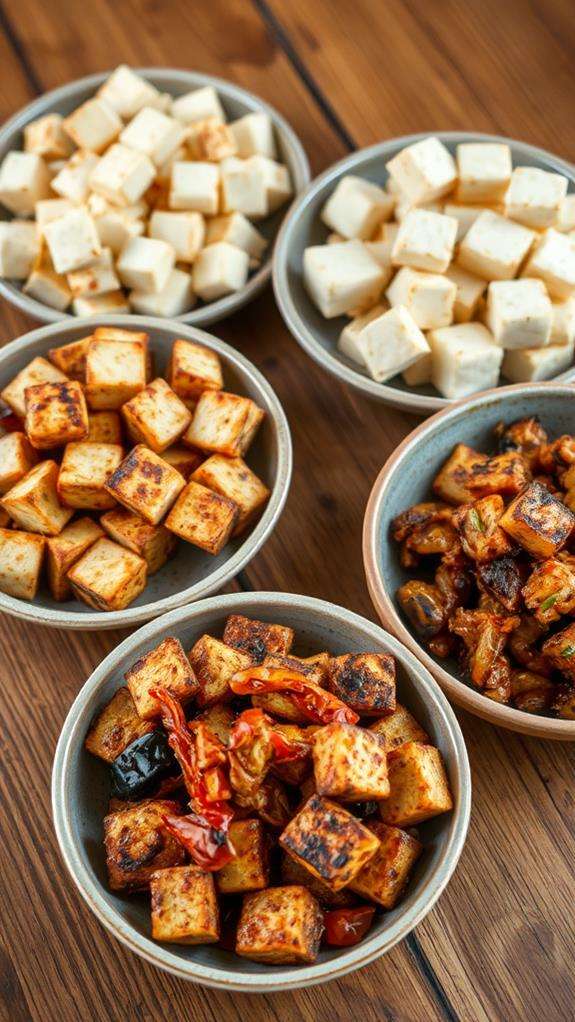Is It Safe to Eat Raw Tofu
Raw tofu is generally safe to eat, but you'll need to take precautions. It's made from coagulated soy milk and packed with protein, essential amino acids, and other nutrients. However, there's a risk of bacterial contamination if it's not handled properly. To minimize risks, buy from reputable sources, store it correctly, and rinse thoroughly before eating. Some experts recommend lightly cooking tofu to eliminate potential pathogens. Raw tofu may also contain enzyme inhibitors and phytic acid, which can affect nutrient absorption. If you have a compromised immune system or are pregnant, you might want to avoid raw tofu. Consider your health status and consult a healthcare professional for personalized advice. The following information will help you make an informed decision about consuming raw tofu.
This post may contain affiliate links. If you make a purchase through these links, I may earn a commission at no additional cost to you. Additionally, portions of this post may be generated using artificial intelligence (AI) technology. While we strive for accuracy, please be aware that AI-generated content may not always be perfect and should be fact-checked when necessary.
The Spatula Scoops
- Raw tofu is generally safe to eat when properly handled and stored at or below 40°F (4°C).
- Consuming raw tofu may preserve heat-sensitive nutrients and provide a lower-calorie option.
- There's a risk of foodborne illness due to bacterial contamination, especially for immunocompromised individuals.
- Rinsing raw tofu thoroughly under cold water and using clean utensils can help reduce contamination risks.
- Lightly cooking tofu eliminates potential risks while maintaining most nutritional benefits.
Understanding Raw Tofu

Tofu's versatility extends beyond cooked dishes, as it can also be enjoyed raw. When you're exploring raw tofu, it's vital to understand what you're dealing with. Raw tofu is fundamentally uncooked soybean curd, made by coagulating soy milk and pressing the resulting curds into blocks. It comes in various textures, from silken to extra-firm, each suited for different culinary applications. Much like properly stored oatmeal, raw tofu can remain safe to eat for some time if handled correctly. However, it's indispensable to inspect raw tofu for any signs of spoilage before consumption.
You'll find that raw tofu has a mild, slightly nutty flavor and a smooth, creamy texture. It's packed with protein, low in calories, and contains essential amino acids. When consuming raw tofu, you're getting its full nutritional profile without any loss due to cooking. However, it's indispensable to handle raw tofu properly to avoid foodborne illnesses. Always check the expiration date, store it in the refrigerator, and use clean utensils when preparing it. For the best taste and texture, you can press raw tofu to remove excess moisture, which also helps it absorb flavors better. Incorporating raw tofu into your diet can be as simple as adding it to smoothies, using it in dips, or slicing it into salads.
Tofu Production Process
In light of understanding raw tofu, it's vital to explore the production process behind this versatile food. The journey begins with soybeans, which are soaked, ground, and boiled to create soy milk. This liquid is then separated from the solid pulp, known as okara. Proper storage techniques are essential for maintaining the quality and safety of tofu throughout its shelf life, whether it's opened or unopened.
Next, you'll find that coagulants are added to the soy milk. These substances, typically calcium or magnesium salts, cause the proteins in the milk to curdle and form curds. The curds are then pressed into blocks, removing excess water and creating the familiar texture you associate with tofu.
The pressing process determines the firmness of the tofu. Soft tofu undergoes minimal pressing, while firm and extra-firm varieties are subjected to more intense pressure. After pressing, the tofu is cooled and packaged.
It's critical to note that while this process doesn't involve cooking the tofu itself, it does include steps that eliminate harmful bacteria. The boiling of soy milk and the use of food-grade coagulants guarantee a level of safety in the final product, even when consumed raw.
Nutritional Profile of Raw Tofu

Understanding the nutritional profile of raw tofu is key to appreciating its role in a healthy diet. This soy-based protein powerhouse offers a wealth of nutrients in a compact package. You'll find that raw tofu is low in calories but high in protein, making it an excellent choice for those looking to maintain or build muscle mass. It's also a good source of essential amino acids, which your body needs for various functions. Much like corn's diverse uses, tofu can be incorporated into numerous dishes and applications, showcasing its versatility in the culinary world.
Raw tofu contains significant amounts of iron, calcium, and manganese, supporting bone health and oxygen transport in your blood. You'll also benefit from its content of phosphorus, magnesium, and zinc. It's worth noting that raw tofu is rich in isoflavones, plant compounds with potential health benefits, including reduced risk of certain cancers and improved heart health. However, keep in mind that raw tofu's nutrient absorption may be slightly lower than cooked tofu due to the presence of antinutrients. The fat content in raw tofu is primarily unsaturated, which is considered heart-healthy. Additionally, it's naturally low in carbohydrates and contains no cholesterol, making it suitable for various dietary needs.
Potential Health Benefits
When you eat raw tofu, you're consuming a protein-rich plant-based food that can support muscle growth and repair. Raw tofu's nutrients are more readily absorbed by your body, as cooking can sometimes reduce the bioavailability of certain vitamins and minerals. As a low-calorie, high-fiber option, raw tofu can help you feel full and satisfied while supporting digestive health and weight management efforts.
Protein-Rich Plant-Based Food
As a protein-rich plant-based food, raw tofu offers a wealth of potential health benefits. You'll find that tofu is an excellent source of complete protein, containing all nine essential amino acids your body needs but can't produce on its own. For every 100 grams of raw tofu, you'll typically get about 8 grams of protein, making it a valuable addition to vegetarian and vegan diets.
In addition to protein, raw tofu is low in calories and fat, yet high in important nutrients like iron, calcium, and magnesium. It's also a good source of isoflavones, plant compounds that may help reduce the risk of certain cancers and heart disease. When incorporating raw tofu into your diet, you're not only diversifying your protein sources but also potentially improving your overall health.
Raw tofu's versatility allows you to add it to smoothies, salads, or cold soups, boosting their nutritional value without considerably altering taste or texture. This makes it an ideal ingredient for those looking to increase their protein intake while maintaining a plant-based diet. Remember, while raw tofu is safe to eat, always guarantee it's properly stored and consumed before its expiration date.
Increased Nutrient Absorption
Beyond its protein content, raw tofu may offer enhanced nutrient absorption compared to its cooked counterpart. When you consume raw tofu, you're potentially benefiting from higher levels of certain nutrients that can be diminished during the cooking process. Heat-sensitive vitamins, like vitamin C and some B vitamins, are better preserved in raw tofu. Additionally, enzymes that aid in digestion and nutrient absorption remain intact when tofu isn't cooked.
Consider the following nutrient comparison between raw and cooked tofu:
| Nutrient | Raw Tofu | Cooked Tofu | Difference |
|---|---|---|---|
| Vitamin C | Higher | Lower | ~20% |
| Folate | Higher | Lower | ~10% |
| Isoflavones | Higher | Lower | ~15% |
It's important to note that while raw tofu may provide increased nutrient absorption, cooking can sometimes enhance the bioavailability of certain compounds. For instance, lycopene in tomatoes becomes more accessible when heated. However, for tofu, the raw form generally retains more of its original nutrient profile. If you're looking to maximize your nutrient intake from tofu, incorporating both raw and cooked versions into your diet might be the most beneficial approach.
Low-Calorie, High-Fiber Option
Packed with fiber and low in calories, raw tofu stands out as an excellent option for those seeking to manage their weight or improve their overall health. It's a nutrient-dense food that provides a substantial amount of protein while keeping calorie intake in check. You'll find that a 3-ounce serving of raw tofu contains only about 70-80 calories, making it an ideal choice for those watching their caloric intake.
The high fiber content in raw tofu contributes to its weight management benefits. Fiber helps you feel fuller for longer, potentially reducing overall food consumption. It also aids in digestion and promotes a healthy gut microbiome. Additionally, the low glycemic index of tofu means it won't cause rapid spikes in blood sugar levels, which can be beneficial for those managing diabetes or trying to maintain stable energy levels throughout the day.
When incorporating raw tofu into your diet, you're not just getting a low-calorie option; you're also benefiting from its impressive nutrient profile. It's rich in essential amino acids, calcium, and iron, all while being low in saturated fat. This combination makes raw tofu an excellent choice for various dietary needs and health goals.
Possible Risks and Concerns

While eating raw tofu can offer certain benefits, you should be aware of potential risks. Raw tofu, like other uncooked foods, may harbor harmful bacteria that can cause foodborne illnesses if not properly handled or stored. Additionally, consuming raw tofu might lead to nutrient absorption issues, as some compounds in uncooked soybeans can interfere with your body's ability to absorb certain minerals and vitamins.
Foodborne Illness Potential
Raw tofu's potential for foodborne illness is a concern for many consumers. While tofu is generally safe to eat raw, there are some risks you should be aware of. The main concern is contamination during processing or packaging, which can introduce harmful bacteria like Listeria or Salmonella.
To minimize the risk of foodborne illness when consuming raw tofu, follow these precautions:
- Purchase tofu from reputable sources and check the expiration date
- Store tofu properly in the refrigerator at 40°F (4°C) or below
- Wash your hands and utensils thoroughly before handling raw tofu
It's important to note that pasteurized tofu has a lower risk of contamination compared to unpasteurized varieties. However, even pasteurized tofu can become contaminated if not handled properly. If you're immunocompromised, pregnant, or have other health concerns, it's best to consult with your healthcare provider before consuming raw tofu.
Nutrient Absorption Issues
In light of raw tofu's nutritional profile, it's important to evaluate potential nutrient absorption issues. When you consume raw tofu, you might not be getting the full nutritional benefits it offers. This is because raw soybeans, from which tofu is made, contain enzyme inhibitors that can interfere with your body's ability to digest and absorb nutrients effectively.
One key concern is the presence of phytic acid in raw tofu. This compound can bind to minerals like iron, zinc, and calcium, potentially reducing their bioavailability. As a result, you might not be absorbing these essential nutrients as efficiently as you would from cooked tofu. Additionally, raw tofu contains trypsin inhibitors, which can hinder protein digestion.
Cooking tofu helps to neutralize these enzyme inhibitors and break down phytic acid, making nutrients more accessible to your body. It's worth noting that while these absorption issues exist, they may not pose significant problems for most people with balanced diets. However, if you're relying heavily on tofu for specific nutrients or have existing nutritional deficiencies, you might want to contemplate cooking your tofu to maximize its nutritional benefits.
Food Safety Guidelines
Although raw tofu is generally safe to eat, following proper food safety guidelines is indispensable to prevent foodborne illnesses. When handling raw tofu, you'll want to pay close attention to storage, preparation, and consumption practices. Always check the expiration date on the package and confirm your tofu hasn't been left unrefrigerated for extended periods.
To maintain food safety when consuming raw tofu, adhere to these key guidelines:
- Store tofu in the refrigerator at or below 40°F (4°C)
- Rinse tofu thoroughly under cold running water before eating
- Use clean utensils and cutting surfaces to prevent cross-contamination
It's imperative to keep your tofu separate from raw meats and other potential sources of bacteria. If you're using pasteurized tofu, you'll have a lower risk of foodborne illness. However, unpasteurized tofu may contain harmful bacteria, so it's best to cook it before consumption. When in doubt, heat your tofu to an internal temperature of 165°F (74°C) to eliminate any potential pathogens. By following these guidelines, you'll drastically reduce the risk of foodborne illness associated with raw tofu consumption.
Expert Opinions on Raw Tofu

When considering raw tofu consumption, you'll find that expert opinions vary. Nutritionists often emphasize the potential benefits of raw tofu, citing its high protein content and intact nutrients that might be altered during cooking. Food scientists, however, tend to focus on the safety aspects, analyzing the risks of bacterial contamination and recommending proper handling and storage techniques to minimize potential health hazards.
Nutritionist Views on Safety
From a nutritional standpoint, experts generally agree that consuming raw tofu is safe for most people. Nutritionists emphasize that tofu, whether raw or cooked, is an excellent source of plant-based protein, calcium, and iron. They often highlight the potential benefits of eating raw tofu, including:
- Preservation of heat-sensitive nutrients
- Retention of more isoflavones, which are beneficial compounds
- Lower calorie content compared to cooked tofu
You'll find that many nutritionists recommend incorporating raw tofu into your diet, especially if you're looking for a protein-rich, low-fat option. However, they also stress the importance of food safety. You should always purchase tofu from reputable sources and verify it's properly stored and handled. If you have a compromised immune system or are pregnant, it's best to consult with your healthcare provider before consuming raw tofu.
Nutritionists also point out that while raw tofu is safe, cooking it can enhance its digestibility and flavor. They suggest experimenting with both raw and cooked preparations to find what works best for your palate and nutritional needs.
Food Scientist Safety Analysis
Food scientists have conducted extensive research on the safety of consuming raw tofu. Their findings indicate that while raw tofu is generally safe to eat, there are some considerations you should keep in mind. The primary concern is the risk of bacterial contamination, particularly from Listeria monocytogenes. This bacterium can survive in refrigerated conditions and potentially cause foodborne illness.
You'll want to pay attention to the tofu's packaging and expiration date. Always check for any signs of spoilage, such as an off-odor or slimy texture. If you're uncertain about the tofu's freshness, it's best to err on the side of caution and cook it thoroughly.
Food scientists also emphasize the importance of proper storage. Keep your raw tofu refrigerated at 40°F (4°C) or below to inhibit bacterial growth. They recommend consuming opened packages within 3-5 days for ideal safety and quality.
While the risk of illness from raw tofu is low, immunocompromised individuals, pregnant women, and the elderly should exercise extra caution. For these groups, cooking tofu to an internal temperature of 165°F (74°C) is advised to eliminate any potential pathogens.
Preparing Raw Tofu Safely
To guarantee safe consumption of raw tofu, you'll need to take a few precautions. First, make sure you're purchasing tofu from a reputable source. Check the expiration date and inspect the packaging for any signs of damage or contamination. Once you've brought it home, store it properly in the refrigerator until you're ready to eat it.
Before consuming raw tofu, follow these steps:
- Rinse the tofu thoroughly under cool running water to remove any surface bacteria.
- Pat the tofu dry with clean paper towels or a kitchen cloth to remove excess moisture.
- Cut the tofu into your desired serving size using a clean knife and cutting board.
It's essential to handle raw tofu with clean hands and utensils to prevent cross-contamination. If you're incorporating raw tofu into a dish, make sure all other ingredients are fresh and properly washed. While tofu is generally safe to eat raw, those with compromised immune systems or pregnant women may want to exercise extra caution. If you're unsure about the quality of your tofu or have concerns about eating it raw, consider lightly cooking it to eliminate any potential risks.
Alternatives to Raw Tofu

While raw tofu can be a revitalizing addition to your meals, it's not everyone's cup of tea. If you're looking for alternatives, you've got plenty of options to explore. Cooked tofu is the most obvious choice, offering versatility and a different texture. You can stir-fry, bake, or grill it to suit your taste preferences.
For those seeking a similar nutritional profile, tempeh is an excellent substitute. This fermented soybean product has a firmer texture and nuttier flavor than tofu. Seitan, made from wheat gluten, is another protein-rich alternative that's particularly popular in vegetarian and vegan cuisines.
If you're after something with a similar consistency to raw tofu, silken tofu might be your best bet. While technically still tofu, its softer texture makes it ideal for blending into smoothies or using as a base for creamy dips and desserts. For a completely different plant-based protein source, consider incorporating legumes like lentils, chickpeas, or black beans into your meals. These versatile ingredients can be used in a variety of dishes, from salads to stews, providing both protein and fiber.
Making an Informed Decision
After exploring the various options, it's time to make an informed decision about whether raw tofu is right for you. Consider your personal health, dietary needs, and taste preferences. If you're comfortable with the potential risks and enjoy the texture of raw tofu, you might choose to incorporate it into your diet occasionally. However, if you're concerned about foodborne illness or have a compromised immune system, it's best to stick with cooked tofu.
To make an informed decision, follow these steps:
- Assess your health status and risk tolerance
- Research reputable sources for up-to-date information on raw tofu consumption
- Consult with a healthcare professional or registered dietitian
Frequently Asked Questions
Can Pregnant Women Consume Raw Tofu?
As a pregnant woman, you should be cautious about consuming raw tofu. While it's generally safe, there's a small risk of foodborne illness. To safeguard against this risk, it's best to cook your tofu thoroughly. Heating destroys potential harmful bacteria like Listeria, which can be especially dangerous during pregnancy. If you're craving tofu, opt for cooked varieties or pasteurized products. Always consult your healthcare provider for personalized advice on your diet during pregnancy to protect both your and your baby's safety.
Does Raw Tofu Taste Different From Cooked Tofu?
Like night and day, raw and cooked tofu offer distinct taste experiences. You'll find raw tofu has a milder, subtler flavor with a creamy, slightly beany taste. It's often described as delicate or neutral. When cooked, tofu's flavor intensifies and can become nuttier or sweeter, depending on the cooking method. Heat also alters the texture, making it firmer and sometimes crispy on the outside. You might prefer raw tofu in cold dishes or smoothies, while cooked tofu shines in stir-fries and grilled dishes.
How Long Can Raw Tofu Be Stored in the Refrigerator?
You can store raw tofu in the refrigerator for about 3-5 days after opening. It's essential to keep it submerged in fresh, cold water, which you should change daily to maintain freshness. Unopened tofu can last up to two months if refrigerated properly. Always check for signs of spoilage, such as a sour smell or slimy texture, before consuming. To extend its shelf life, you can freeze tofu for up to three months, though this may alter its texture slightly.
Are There Any Specific Brands of Tofu Better for Raw Consumption?
You'll find that most major tofu brands are suitable for raw consumption. However, some brands specifically market their tofu as "ready-to-eat" or "silken," which are often preferred for raw dishes. Look for brands like Mori-Nu, House Foods, or Nasoya, which offer high-quality, pasteurized products. It's essential to check the packaging for any specific instructions or recommendations. Remember, while all commercially produced tofu is technically safe to eat raw, some varieties may have a better texture or flavor profile when consumed uncooked.
Can Raw Tofu Be Used in Smoothies or Cold Desserts?
Yes, you can use raw tofu in smoothies and cold desserts. It's a versatile ingredient that adds protein and a creamy texture. For smoothies, silken tofu works best as it blends seamlessly. In cold desserts, like puddings or mousses, firm tofu can provide structure. When using raw tofu, guarantee it's fresh and properly stored. You'll want to drain and pat it dry before adding it to your recipes. Remember, raw tofu has a mild flavor, so it won't overpower other ingredients.
Conclusion
You've navigated the nuanced nature of noshing on raw tofu. While it's generally safe, you should still stay savvy about sanitation. Consider cooking for complete comfort, but if you choose to consume it raw, clean carefully and buy from reputable retailers. Remember, raw or roasted, tofu's a terrific, versatile vegetarian option. Ultimately, your decision depends on personal preference and precautions. Whether you sauté or serve it straight, savor this soy-based staple sensibly and safely.





